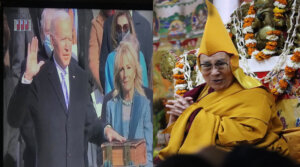US Congress members urge President Biden to meet with Dalai Lama

DHARAMSALA, 15 Dec: A bipartisan US Congress on Tuesday has urged President Joe Biden to meet with the Dalai Lama as they declared that the “advocacy for the rights and dignity of the Tibetan people is essential to any principled foreign policy,” to protect the rights, autonomy, and dignity of the Tibetan people.
“President Biden can demonstrate the importance of His Holiness’ moral message and example by inviting His Holiness to meet in the Oval Office to discuss shared interests and strategies for addressing the world’s most pressing problems,” read a bipartisan letter signed by 38 senators and 27 House members of the US Congress addressed to Uzra Zeya, Under Secretary of State for Civilian Security, Democracy and Human Rights at the U.S. Department of State, ahead of her expected appointment as Special Coordinator for Tibetan Issues.
The letter to the Under Secretary of State Uzra Zeya- an office that traditionally doubled as the special coordinator of further stated that “If His Holiness is unable to travel, then the President should seek an opportunity to meet with him in India, or send a high-level representative, such as the Vice President or a cabinet official, to do so in his stead.”
In Sept 2020, while running for the office, Biden promised that if elected to power, he will meet with His Holiness the Dalai Lama, appoint a new Special Coordinator for Tibetan Issues, press the Chinese government to restore access to Tibet for US citizens, diplomats, and journalists beside declaring that his administration will stand up for the people of Tibet with sanctions against Chinese officials responsible for human rights abuses in Tibet.
Biden’s predecessor, former US President Donald Trump is the only US President who has not met the Dalai Lama since George H. W. Bush, the 41st US President, and the first American President to meet with the Tibetan spiritual leader.
“Tibet matters to us, not only as an issue that is important to our constituents and the Tibetan-American community, but also as a tangible manifestation of a principled foreign policy that prioritizes human rights and the quest for human dignity. We stand ready to work with you on this urgent moral issue,” read the letter led by Marco Rubio, R-Fla., and Patrick Leahy, D-Vt., in the Senate and Jim McGovern, D-Mass., and Chris Smith, R-NJ, in the House.
The letter further called for an end to the practice of calling Tibet part of China.
“We appreciate that the Tibet section of the 2020 Country Reports on Human Rights Practices does not refer to Tibetan areas as “part of the People’s Republic of China,” the lawmakers said and added that “consistent with the State Department’s calls for dialogue without preconditions, we urge the continued exclusion of this phrase from future reports and statements, both as a means to promote renewed negotiations between the Chinese government and the Dalai Lama or his representatives, and as an opportunity to ground U.S. policy in a respect for historical accuracy and affirm the Tibetan peoples’ rights under the International Covenant on Civil and Political Rights.”
While Zeya’s appointment as special coordinator for Tibetan issues in the State Department is expected soon, the US lawmakers have outlined various steps that the Biden Administration, and Congress, can take to advance U.S. policy on Tibet consistent with U.S. law, including the 2002 Tibetan Policy Act and the 2020 Tibetan Policy and Support Act (TPSA).
The letter also called for the administration to engage with the Dalai Lama and the Central Tibetan Administration (CTA) in Exile.
Additionally, it also called for supporting religious freedom of the Tibetan people; advocating on behalf of Tibetan political prisoners; expanding the United States’ access to Tibet; reinvigorating a political initiative to enhance Sino-Tibetan dialogue; reaffirming the unresolved nature of Tibet’s political status and the PRC’s obligation to provide meaningful autonomy to Tibetans; addressing obstacles faced by Tibetan refugees in Nepal; Supporting the preservation of Tibetan language and culture, and Prioritizing multilateral coordination on policy initiatives pertaining to Tibet.






